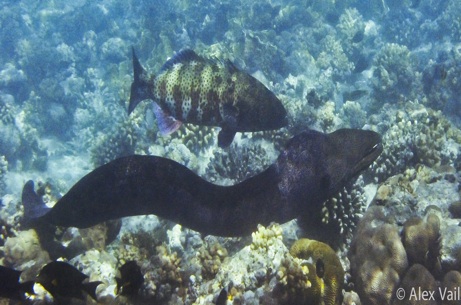
Coral trout can now join chimpanzees as the only non-human species that can choose the right situation and the right partner to get the best result when collaboratively working, according to new research led by Alexander Vail.
Coral trout can now join chimpanzees as the only non-human species that can choose the right situation and the right partner to get the best result when collaboratively working, according to new research led by a Gates Cambridge Scholar.
Coral trout are fast when chasing prey above the reefs of their habitat, but can’t pursue their quarry if it buries itself into a hard-to-reach reef crevice.
When this happens, the trout will team up with a snake-like moray eel to flush out the unfortunate fish in a remarkable piece of interspecies collaboration: either the eel takes the prey in the reef, or scares it back into the open so the trout can pounce.
Coral trout – along with close relative the roving coral grouper – will use gestures and signals to flag the location of prey to an eel, including head shakes and headstands that actually point the eel in the right direction. Field observations also suggested that they have a startling ability to assess when a situation needs a collaborator and to pick the right partner in the vicinity to get the best hunting results.
Now, for the first time, researchers at the University of Cambridge have cross-examined the collaborative capacities of these trout with the highly-intelligent chimpanzee using comparably similar experiments, and found that the fish perform as well – if not better – than humankind’s closest evolutionary relative when it comes to successful collaboration.
The trout even match chimpanzees in the ability to learn at speed which possible collaborator is the best candidate for the job. The study is published today in the journal Current Biology.
The researchers caught wild coral trout and recreated hunting scenarios in set-ups that mirrored their natural environment, with the aim of creating experiments analogous to those previously conducted using chimpanzees – known as the rope-pull experiments – except relevant to the trout’s habitat.
In the 2006 rope-pull experiments, chimps were shown fruit placed on a plank parallel to but out of reach of their cage. At each end of the plank a rope was attached that trailed within reach. Two chimps would have to coordinate the simultaneous tugging of the rope to reel in the fruit.
Similarly, the trout were presented with out-of-reach food in the form of prey secreted in a crevice, and the possibility of a collaborator that took the shape of a model moray eel as fashioned by the researchers.
The trout undertook the same number of trials as the chimps over a similar time frame. When conditions required collaboration, i.e. when the food was out of reach, the trout were at least as proficient as chimps at determining when they needed to recruit a collaborator, doing so in 83% of cases, and learned more effectively than chimps when the collaborator was not necessary.
When the trout were given the choice between two fake moray eels – one a successful collaborator that flushed out prey and the other which swam in the opposite direction – the trout’s ability to pick the successful partner was identical to that of the chimps.
For both trout and chimps, six subjects participated in six trials per day for two days. On the first day, while they were learning about the collaborators’ effectiveness, the trout choose each collaborator and equal number of times. But by day two they were over three times more likely to choose the effective hunting partner over the infective partner, a significant increase that matches the selection prowess of the chimps in the rope/pull experiment and appears to demonstrate rapid learning in the fish.
“Our results show that, like chimpanzees, trout can determine when a situation requires a collaborator and quickly learn to choose the most effective one,” said Alexander Vail [2010], a Gates Scholar from the University of Cambridge’s Department of Zoology, who led the study.
“This study strengthens the case that a relatively small brain – compared to warm-blooded species – does not stop at least some fish species from possessing cognitive abilities that compare to or even surpass those of apes.”
The study’s authors caution that the processes underlying such “superficially similar” cognitive behaviour are not known, and that – as previous commentators have stated – complex behaviour doesn’t always reflect a complex mind.
However, the researchers say that the increased effectiveness of the trout’s ability to judge when to employ an eel collaborator would suggest that the accessibility of each prey was being assessed. In fact, it was the same research team which recently demonstrated that coral trout and grouper use the intentional headstand communication to summon and signal morays and other partner species towards prey, published in Nature Communications last year.
“Perhaps the biggest question is whether the processes underlying collaborative partner choice in humans, chimpanzees and trout are the result of common ancestry or an evolutionary convergence,” added Vail. “Convergence – where species of different lineages evolve similar features – has been suggested as the reason for other superficially similar ape and human abilities, and is the most likely reason why trout would seem to share this one too.”












